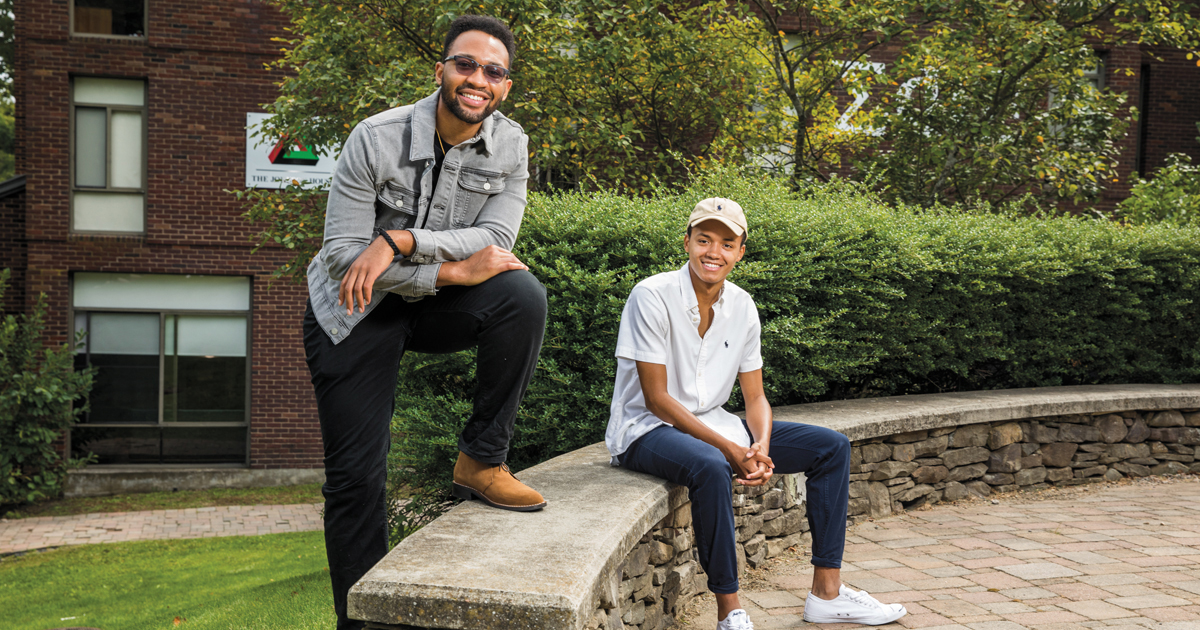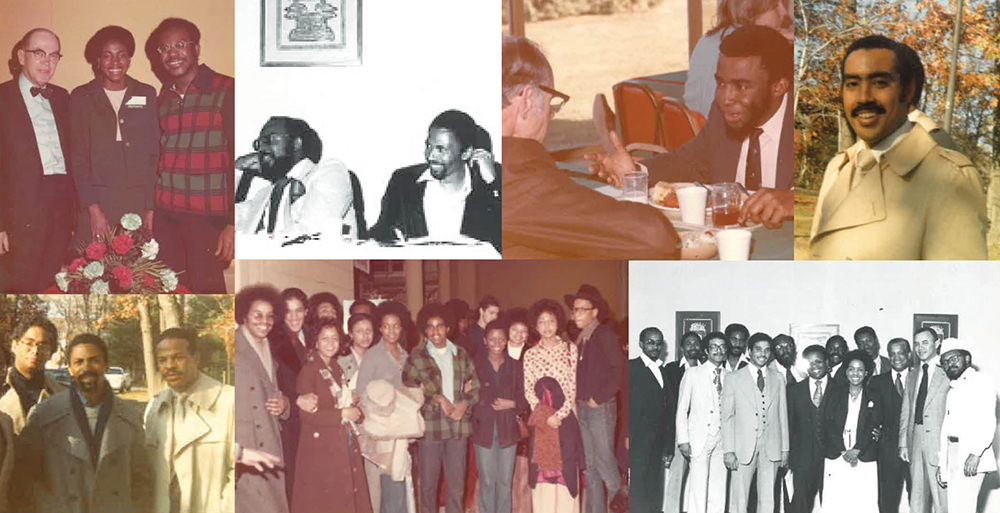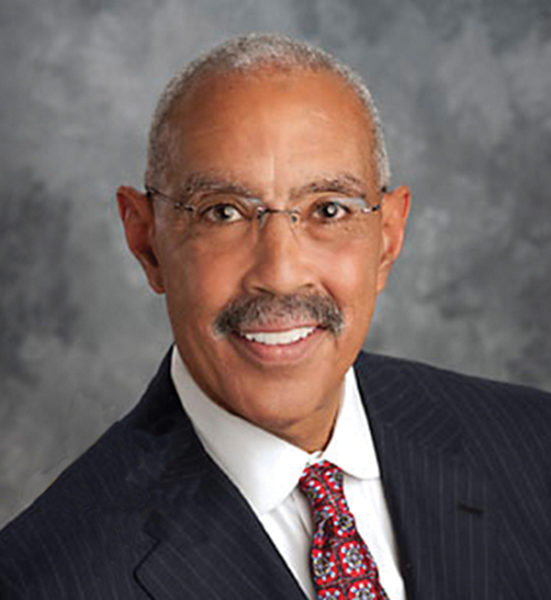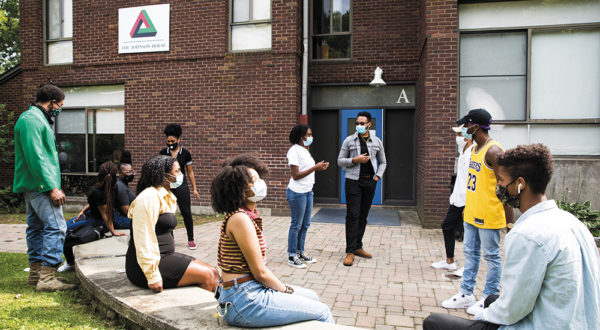Black Student Union at 50: Its Impact, Meaning, and Future

The common room at The Johnson House is where the magic happens.
On a day-to-day basis, the 14 of us residents simply are going through the minutiae of student life—classes, studying, extracurricular activities, ventures, future plans—but it is the moments when two or four or six of us are just sitting in the common room that make it all worthwhile.
The Johnson House is the new special-interest housing for members of the Black Student Union (BSU). It’s extra special for us not only because of the hard work it took in the past year to secure the 15-room housing in Canfield Hall, but also because it’s named for the founder of the BSU, which is celebrating its 50th anniversary this year.
The center of The Johnson House is our common room. That’s where we come together, embracing both vulnerability and positivity. That’s where we congregate, relax, have fun, and ponder deep questions about what makes us the same, what makes us different, what makes us unique.
The other night, Xiomara Kelly ’21, the BSU’s chief operating officer, and Mezue Eneh ’22, The Johnson House’s community manager, happened upon a conversation about dreams—what they mean, and how we relate to them. The kinetic energy in the space soon attracted other residents—its gravitational pull giving our community life and purpose.
That’s what the Black Student Union means to us.

Over a half-century, the members of the Black Student Union have impacted not only life on Babson’s campus and the wider community but also one another’s lives.
‘A Place of Comfort and Support’
Eric Johnson ’72, P’08 knows all about dreams—having them, fostering them, realizing them.
The son of a successful businessman, raised on Chicago’s South Side, Johnson now is the president and CEO of Baldwin Richardson Foods, one of the largest Black-owned businesses in the food industry. He made his way to Babson College during the late 1960s—tumultuous times that are reminiscent of the racial and political tensions of today.

Eric Johnson ’72, P’08, founded Babson’s Black Student Union 50 years ago.
Back then, it was Vietnam and the Democratic National Convention, the assassinations of Martin Luther King Jr. and Robert Kennedy, and the Kent State and Jackson State shootings. Now, it’s George Floyd, Breonna Taylor, and Ahmaud Arbery; it’s Black Lives Matter and the fight for racial justice; and it’s a pandemic that has disrupted all of our lives.
In a recent phone call with Jaylen Bell ’21, the current BSU president, Johnson recounted the similarities with his turbulent era.
“All those events made the campus highly political, and the students very, very engaged,” Johnson said. “There are similar elements in place now, so the need for a Black Student Union—a place of comfort and support—is just as important today as it was 50 years ago.”
In 1970, during the founding of the BSU, there were just 12 Black students on Babson’s campus. Given that the initial founding class was very small, Johnson and the BSU partnered with Black students at other college campuses in the area. That lesson resonates strongly with us, as the BSU continues to strive to extend its reach beyond Babson’s campus even to this day.
“There are similar elements in place now, so the need for a Black Student Union—a place of comfort and support—is just as important today as it was 50 years ago.”
Eric Johnson '72, P'08, founder of the Black Student Union
That investment of outreach and determination by Johnson and his classmates in the early days truly has returned impressive dividends. Today, there are 133 Black students on campus as we celebrate the 50th anniversary of the BSU. For Johnson, that tenfold growth is a testament to the lasting success of the BSU.
“Anytime that you can do something that becomes sustainable, that is, in and of itself, a real tribute to the cause,” Johnson said. “But, the main thing that I’ve seen out of this is there has been a lot of perseverance and a lot of protecting the purpose of what the Black Student Union is all about.”
Over the years, our organization has been directed by top-notch student leaders. In particular, a group of old-school alumni—who now refer to themselves as the “OGs”—helped grow the BSU from its founding through its formative years, including John Frazier ’71, Rudy Crew ’72, H’96, Gary Rawlins ’73, Rodney Carter ’76, Melvin “Chuckie” Clark ’76, Craig Thaxton ’76, Gerald Watson ’76, Gary Burke ’77, Chris Cephas ’77, Leslie Fleuranges ’79, Sherrin Stokes-Fowlkes ’79, Ulysses Grant Smith ’81, and Kevin White ’88.
One of the central figures was Dr. Geoffrey Kapenzi, a sociology professor, who mentored many of the BSU alumni into successful entrepreneurs and business and community leaders. Crew, for example, went on to become chancellor of the New York City Department of Education.
“Doc Kapenzi was the heart of our survival,” Carter said recently. “He gave us the standard of our interaction with each other.” Those interactions, he says, developed into creating their own peer-mentorship groups in their hometowns, such as Baltimore, New York, and Chicago.
“After graduation,” Carter said, “we attended and participated in each other’s weddings, became godparents, and cried at our peers’ Homegoing services.”
That’s what the Black Student Union means to the alumni who built and nurtured it.

Residents outside The Johnson House, the new special-interest housing for members of the Black Student Union.
A Vision for the Future
Today, the BSU embraces all of the lessons of the past—with a strong focus on the future. We are honored to name the physical manifestation of BSU after Eric Johnson with a vision to impact not only Babson’s campus but also the Greater Boston community.
“It’s a tremendous tribute, and I almost can’t put it into words what it really means, other than to say that the students who are there today created this environment,” Johnson said. “They created it, and they created the purpose and strategy behind it. To me, that is the best honor.”
We are trying to build something economically with the opportunities presented to us while celebrating the uniqueness of coming from a common thread of the African diaspora.
In our research and planning for The Johnson House, we discovered that the median net worth of a Black household in Boston is just $8—yes, $8. The house was created with a mission to help create the solution to that problem, and we now meet regularly in the common room to tackle it. We are trying to build something economically with the opportunities presented to us while celebrating the uniqueness of coming from a common thread of the African diaspora.
BSU is a student organization, but we want it to be more than just that. We talk about the future all the time, and it is invigorating. We talk about the decades ahead and how we can make this moment impactful. We talk about what we can do right now to ensure that those who come after can build upon what we have done—the same way we have been able to build on the foundations created by our predecessors over the past five decades.
That’s what the Black Student Union means for the next 50 years.
Posted in Community




